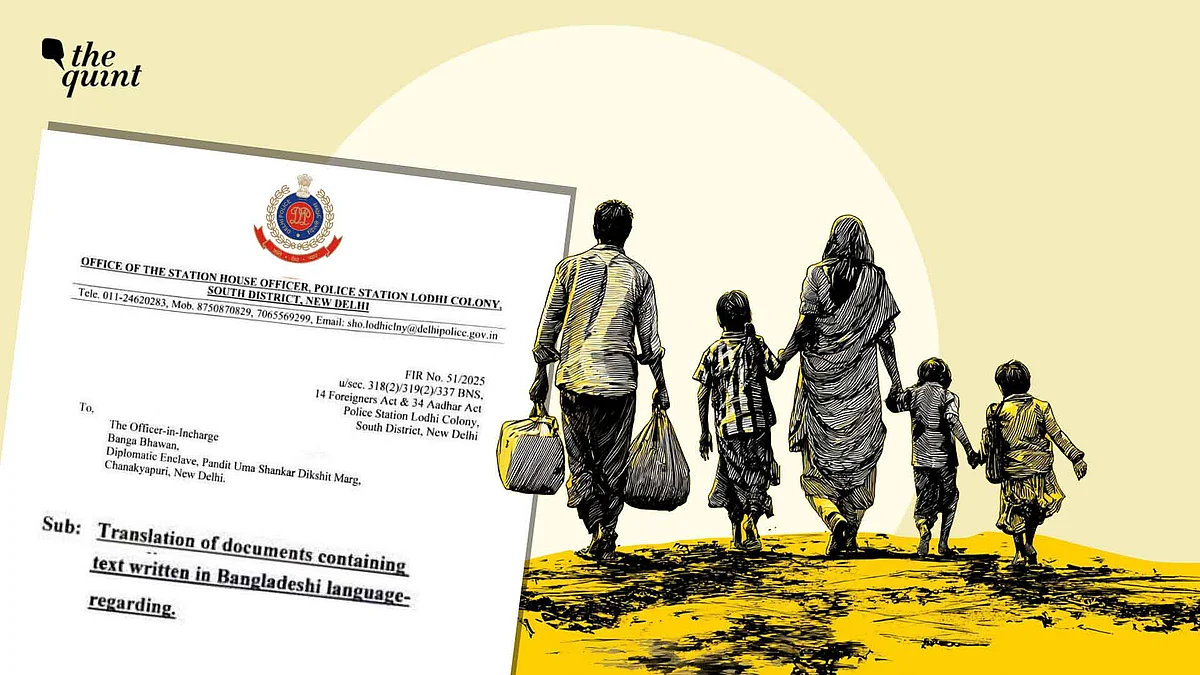
Bengali or Bangladeshi? Delhi Police’s Language Blunder Isn’t Just Ignorance
A letter written by the Delhi Police, which surfaced online on 3 August, has sparked outrage amongst Bengalis.

advertisement
A letter written by the Delhi Police, which surfaced on social media on 3 August, has set off a storm of outrage amongst Bengalis. In the letter, the police have sought the help of Banga Bhawan, the official guest house of the state of West Bengal in Delhi, in translating some documents written in “Bangladeshi language” that were picked up from eight people suspected to be illegal immigrants from Bangladesh.
“Bangladeshi language?" Seriously? Are the Delhi Police so ignorant that they are unaware that Bangla, the language spoken by India’s Bengalis, is also the language of Bangladesh, albeit with some variations in accent and vocabulary? If they requested Banga Bhawan for a translation, surely they must have known that the language in question was, in fact, the language of the Indian state of West Bengal.
And yet they went ahead and termed it “Bangladeshi”, smoothly conflating Indian Bengalis with those belonging to Bangladesh—and, in the context of the ongoing drive against illegal Bangladeshi immigrants, lending a whiff of dubiousness to the Bengali language itself.
The letter by Delhi Police.
Mamata’s Fury, BJP’s Fuel
Understandably, West Bengal Chief Minister and Trinamool Congress (TMC) supremo Mamata Banerjee has been spitting fire over the Delhi Police describing Bangla, which is spoken by more than 9 crore Indian citizens, as “Bangladeshi language”.
Bharatiya Janata Party (BJP)'s IT cell head, Amit Malviya, ever ready to justify the unjustifiable, added fuel to fire, arguing on social media that Bengali has many variants and there is “no language called Bengali that neatly covers all these variants.” (He forgot to mention the fact that most Indian languages come with several regional variations.)
Malviya’s comments provoked another furious reaction from the TMC, which said, “Denying the existence of a constitutionally recognised language is nothing short of linguistic apartheid.”
Linguistic Apartheid or Political Hyperbole?
This may sound like one more political hyperbole, but the truth is that reality has inched chillingly close to it. In their zeal to pick up illegal immigrants from Bangladesh, governments in the BJP-ruled states such as Odisha, Haryana, Maharashtra, Rajasthan, and Chhattisgarh have thrown several hundred Bengali-speaking migrants from West Bengal and Assam into detention centres.
In June this year, at least seven Bengali-speaking persons from Maharashtra and other states were pushed into Bangladesh without due process and without any legitimate verification of their nationality. Later, they were confirmed as Indian citizens and repatriated through legal and diplomatic efforts.
The Return of the Language-Religion Test
Others may not be so lucky. In Gurugram, a stone’s throw from the national capital, the police have been rounding up Bengali-speaking migrant workers because they believe them to be Bangladeshi infiltrators.
The police, in Gurugram and elsewhere, seem to be acting on the assumption that if you speak Bengali, you could be Bangladeshi. And if you speak Bengali and are Muslim to boot, you are even more likely to be from that country, and, therefore, should be hauled off to a detention centre and kept there until you can prove your Indian citizenship. Or not, in which case you face deportation.
The migrants are being told to provide birth certificates or passports to establish their Indian nationality. This is a patently cruel and unfair demand. How many people who leave their impoverished rural homes in search of a better life elsewhere, come armed with a birth certificate? How many poor folk working at low-end jobs in the informal sector and barely able to make ends meet, get around to obtaining a passport?
A Dangerous Conflation Ahead of Elections
The government may be within its rights to identify and deport foreign nationals residing as illegal aliens in our country. But that effort cannot be indiscriminate and prejudicial against its own citizens.
It's little wonder, then, that Bengali and Bangladeshi have become synonymous in the collective consciousness of state agencies such as the Delhi Police.
With West Bengal and Assam going to the polls next year, the government’s aggressive drive against so-called Bangladeshi immigrants will, of course, be part of the electoral calculus of both the BJP and the TMC.
It will likely pay dividends for the BJP in Assam, which has a long history of virulent animosity towards Bengali settlers, whether from Bengal or Bangladesh, and where the Citizenship Amendment Act (CAA) and the National Register of Citizens (NRC) have already excluded lakhs of Bengali-speaking Muslim residents from the citizenship umbrella.
Mamata’s Identity Card
In Bengal, Mamata, who is seeking a fourth term in power, will drum up the issue as a sinister attempt on the part of the BJP to carry out linguistic profiling in order to criminalise bona fide Indian Bengalis and render them stateless by denying their citizenship.
While this may further bolster her support amongst the state’s 2.4 crore Muslims (it is mostly the Muslims who have borne the brunt of the war cry against illegal immigrants), it could resonate amongst other Bengalis as well.
Though governance, or the lack of it, will doubtless be the overriding issues of the upcoming elections in West Bengal, Mamata will hope that Bengalis will look askance at any regime that has turned their linguistic identity into a mark of suspicion and potential illegality.
(Shuma Raha is a journalist and author. She tweets @ShumaRaha. This is an opinion piece and the views expressed are the author’s own. The Quint neither endorses nor is responsible for them.)
- Access to all paywalled content on site
- Ad-free experience across The Quint
- Early previews of our Special Projects
Published: undefined